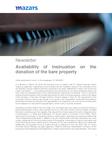
Availability of insinuation on the donation of the bare property
In a decision of March 19, 2019, the Supreme Court of Justice, with Dr. Octavio Augusto Tejeiro Duque as rapporteur, regarding the way to determine the mandatory nature of the insinuation when the donation contract relates to the bare ownership of an asset, stated that "in cases such as the one under examination (...), the parties themselves have the power to value the contractual object and from there the peremptoriness of the aforementioned requirement is defined". Thus, it would be sufficient that the parties to the contract agree that the value of the bare property, which is the object of the donation, is less than 50 legal monthly minimum wages in force, for the requirement of the insinuation before a notary to be waived. In our opinion, this interpretation means that the parties to the donation contract can decide on the applicability of an imperative rule, such as the one that refers to the obligation to insinuate the large donation, which is why it must be reviewed.
According to Article 1458 of the Civil Code, "it is incumbent upon the notary to authorize through a public deed donation whose value exceeds the sum of fifty (50) monthly minimum wages, provided that donor and donee are fully capable, they request it by mutual agreement and no legal provision is contravened. (...)" [Bold and underlined]. For its part, Article 3 of Decree 1712 of 1989, "which authorizes the insinuation of donations before a notary public," specifies this purpose by stating that "the corresponding public deed, in addition to its own requirements and those required by law, must contain reliable proof of the commercial value of the property, of the status of owner of the donor and of the fact that the donor retains what is necessary for his own subsistence" [Bold and underlined]. Additionally, the Supreme Court of Justice, through a judgment of June 26, 2016, with Dr. Álvaro Fernando García Restrepo as judge rapporteur, made an extensive interpretation of Article 3 of the previously mentioned decree and stated that, in order to authorize the insinuated donation, "the notary must be fully convinced that [both the donor], as well as his economic dependents and creditors, will not be negatively affected by the donation" [Bold and underlined].
Pursuant to Article 3 of the aforementioned decree, the insinuation must be accompanied by reliable proof of the commercial value of the property, and the parties may not fix it arbitrarily. We consider that, in our legal system, there is no rule that enables to distinguish between the cases in which the object of the donation is the full ownership and those in which it is the bare ownership of an asset. In consideration of this point, it is not understandable, then, that the Supreme Court of Justice distinguishes between such cases in order to conclude that, in the case of a donation of full ownership, the obligatory nature of the insinuation must be defined according to the commercial value of the donated property according to reliable evidence; and, in the case of a donation of bare ownership, the enabling criterion for such requirement is the will of the parties to the donation contract expressed in the valuation of such right.
From the material point of view, we do not believe that there is any reason to distinguish between the two cases. It could be thought, for example, that the donation of the full ownership of a large asset is extremely more damaging than the donation of the bare ownership, under the understanding that, in this case, the donor reserves the usufruct on the asset and may respond to his creditors and dependents with the fruits he receives from it. However, the dismemberment of the full ownership affects the venal value of the remaining right and, in this way, the assets of the donor who, at the same time, is his general pledge as debtor in relation to his creditors.
On the other hand, the prerogative of disposition on the obligatory nature of the insinuation, created in this case by the Supreme Court of Justice, would facilitate the absolute defrauding of third party creditors, rendering ineffective the measure provided by the Civil Code to prevent such effect. With such purpose, it would be possible for a debtor to make the donation of the bare ownership of his property without insinuation, after the appraisal of such property below 50 minimum wages, in order to later consider as fulfilled the condition or the term on which the unification of the bare ownership with the usufruct in the head of the third party donee depends, consolidating in this way the total alienation of the property.
To the extent that the requirement analyzed, according to what has been said, has as its purpose the protection of third parties, economic dependents and creditors, the Supreme Court of Justice is wrong to make its obligatory nature depend, in this case, on the price freely fixed by the parties to the contract of donation that falls on the bare ownership, especially under the understanding that the bare ownership can be subject to economic valuation, according to objective hermeneutical keys, as occurs for example in tax matters.


